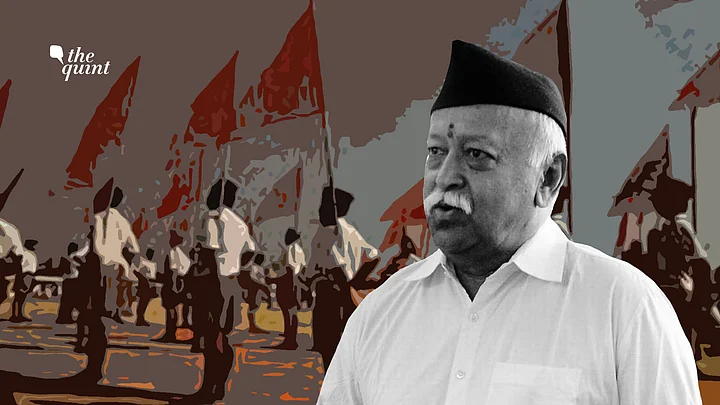The year 2023 will often be characterised by the profound ideological, social, and political transformations across India that were spearheaded by Prime Minister Narendra Modi and the influential Rashtriya Swayamsevak Sangh (RSS).
We witnessed a confluence of proactive measures, strategic political appointments, and unprecedented policy endorsements within the RSS.
As we reflect on 2023, it becomes evident that this year marks a transformative phase, where the RSS navigated the delicate balance between tradition and adaptation under Modi's leadership.
Advocacy for UCC: A Long-cherished RSS Aspiration
The Bharatiya Janata Party's (BJP's) unwavering commitment to pursuing the Uniform Civil Code (UCC) is one of the longest-standing demands of the RSS. This convergence underscores a paradigm shift, as the age-old aspiration for a common civil code becomes a focal point in India's political narrative. The RSS's vocal advocacy for the UCC in 2023, coupled with Modi's support, marks a rare alignment of political will and ideological conviction.
This not only cements the RSS agenda but also signals a profound political victory. PM Modi's unambiguous endorsement signifies a departure from political norms and underscores the transformative impact of the RSS agenda on India's governance landscape.
The RSS's vision for a culturally unified India, as formally expressed in the 1951 Pune Resolution, prominently featured the UCC as a crucial component. This vision aligned with their overarching goal of establishing a Hindu Rashtra.
The BJP took a significant step by introducing a bill for the UCC through a comprehensive legislative process in Uttarakhand. Presently, the bill awaits examination by a select committee in the state assembly, marking a notable progression in the RSS's historical pursuit of the same.
Strategic CM Appointments in the Hindi Heartland
In the aftermath of the recent electoral triumphs in Madhya Pradesh, Rajasthan, and Chhattisgarh, the BJP has orchestrated a strategic and surprising series of chief ministerial appointments.
The selection of Mohan Yadav, an OBC (Other Backward Classes) leader, in Madhya Pradesh; Bhajan Lal Sharma, a Brahmin, in Rajasthan; and Vishnu Deo Sai, a tribal leader, in Chhattisgarh, has left political pundits in awe. What ties these leaders together, beyond their BJP membership, is their strong connection to the RSS.
But certain observers contend that Modi's practical and development-oriented strategy may not harmonise seamlessly with the more dogmatic and culturally-oriented priorities traditionally upheld by the RSS.
For example, RSS general secretary Dattatreya Hosabale, one of the top brass of the Sangh Parivar, slammed the Modi government last year, saying, "The poverty in the country is standing like a demon in front of us. It is important that we slay this demon. That 20 crore people are still below the poverty line is a figure that should make us very sad."
Abrogation of Article 370: A Decades-old RSS Demand
The Supreme Court's recent affirmation of the abrogation of Article 370 in Kashmir stands as a watershed moment in Indian history, symbolising an ideological victory for the RSS.
This decision aligns perfectly with the Sangh's longstanding demand and validates a historical journey towards ideological convergence.
The roots of the RSS's position on Article 370 delve deep into India's post-independence landscape. MS Golwalkar's (then RSS sarsanghchalak) meeting with Maharaja Hari Singh marked the early stages of the Sangh's involvement in the issue. Similarly, Syama Prasad Mukherjee, the founding president of Jana Sangh, the party from which the BJP was later formed, was also in support of the abrogation of Article 370.
Kashi Vishwanath To Krishna Janmabhoomi
The recent legal developments in the Gyanvapi Masjid case in Varanasi concerning the Vishwanath Temple and the Krishna Janmabhoomi case in Mathura have set the stage for a significant reconfiguration in India's socio-political landscape, bringing a new wave of Hindutva to the forefront.
While the outcomes of these cases remain uncertain, the very fact that these historical sites are now under legal scrutiny reflects the rising prominence of Hindutva narratives in public discourse.
For the RSS, these legal battles symbolise a vindication of their long-standing efforts to assert the Hindu identity in India. The ongoing legal scrutiny, regardless of the verdicts, serves as a testament to the enduring influence of the RSS's agenda on the country's socio-cultural dynamics.
The rise of Hindutva, rather than electoral victories, remains the true source of satisfaction for the RSS in 2023.
Caste Dynamics: A Departure from Tradition
In 2023, the RSS, traditionally steadfast on caste hierarchies, hinted at a transformative shift. Chief Mohan Bhagwat's explicit support for caste-based reservations marked a departure from prior calls for their eventual abolition. This nuanced stance, though not a wholesale embrace of social egalitarianism, aligns with the BJP's refined approach to engaging Dalit and backward-class voters, showcasing an evolving strategy.
While the RSS still clings to hierarchical notions within Hindu society, the acknowledgment of the necessity for reservations signals a crucial step towards recognising the realities faced by millions.
Whether this shift is a genuine evolution or a tactical manoeuvre remains to be seen, but it has the potential to reshape the RSS's relationship with caste, especially at a time when the BJP is recalibrating its caste equation post-state election victories.
The RSS's stances in 2023 send a subtle message to the BJP, indicating a willingness to adapt if granted due respect, positions of influence, and ideological alignment.
And one truth blazes in Modi's 2024 crucible: he and the RSS share an existential bond. Modi faces not just external rivals but potential shadows within the BJP itself. To solidify his hold and win 2024, he needs the RSS. They can provide the ideological bedrock, organisational muscle, and social sway that he craves.
So, 2023 wasn't just another chapter; it was an RSS masterclass in shoring up Modi's base.
[The author teaches journalism at St. Xavier's College (autonomous), Kolkata, and is a columnist (He tweets at @sayantan_gh.) This is an opinion piece and the views expressed above are the author’s own. The Quint neither endorses nor is responsible for them.]
